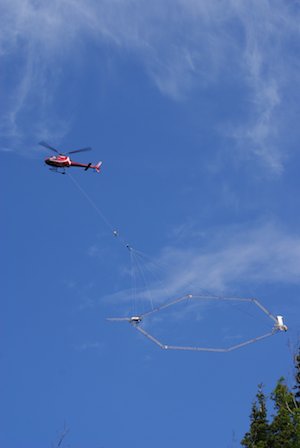
Features
Mapping
Research
SkyTEM to map aquifers for Geoscience BC’s Peace Project
July 15, 2015 By Ground Water Canada

|
July 15, 2015, Vancouver – Geoscience BC has chosen helicopter-borne geophysical company SkyTEM
Canada to fly the 2015 Peace Project Phase I
airborne electromagnetic survey over northeast British Columbia's Peace
Region.
 |
July 15, 2015, Vancouver – Geoscience BC has chosen helicopter-borne geophysical company SkyTEM
Canada to fly the 2015 Peace Project Phase I
airborne electromagnetic survey over northeast British Columbia's Peace
Region.
The Peace Project will generate new information about
groundwater that will facilitate its protection, initially within an
8,000-square-kilometre region that stretches from Hudson's Hope and Fort
St. John northwest to between Pink Mountain and Trutch. The Phase I
airborne survey component of the Peace Project was slated to start in
mid-July and depending on weather, will take approximately 40 days to
complete.
SkyTEM, which has an office in Ayr, Ont., is a helicopter-borne geophysical system
designed specifically to map aquifers. The Danish Ministry of
Environment developed SkyTEM in the late 1990s to collect the data
necessary for making critical decisions about the protection and
sustainability of the country's ground water resources. The company's
clients include the US Geological Survey (USGS), the BRGM (Government of
France), CSIRO and Geoscience Australia, as well as Departments of
Water in India, Thailand, Germany and Belgium.
Bailey Helicopters Ltd.,
headquartered in Fort St. John, has been retained to fly the SkyTEM
system for the Peace Project airborne survey.
The
Peace Project was announced in March 2015 and is a collaborative effort
that will help to increase understanding of surface and ground water
resources in the Peace Region. Project partners include the BC
Oil and Gas Commission, the BC Oil and Gas Research and Innovation
Society, Conoco Phillips Canada, Progress Energy Canada Ltd., the
Province of British Columbia, and the Northern Development Initiative
Trust (NDIT).
Print this page